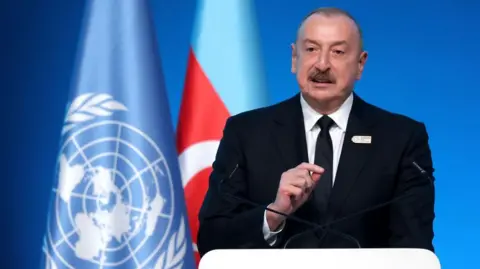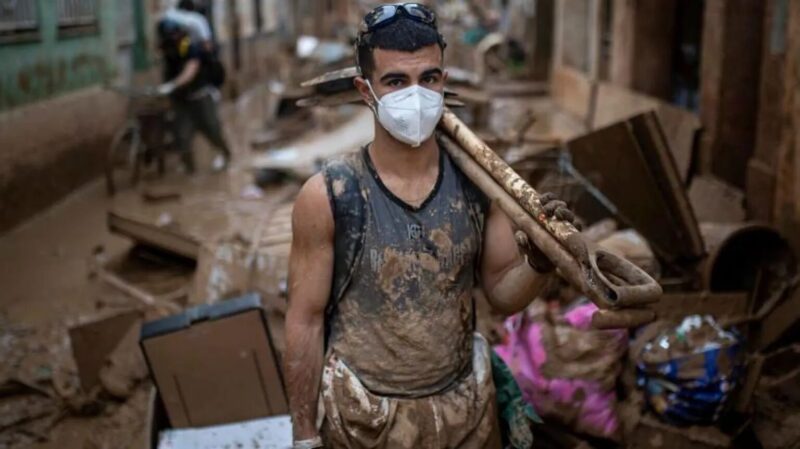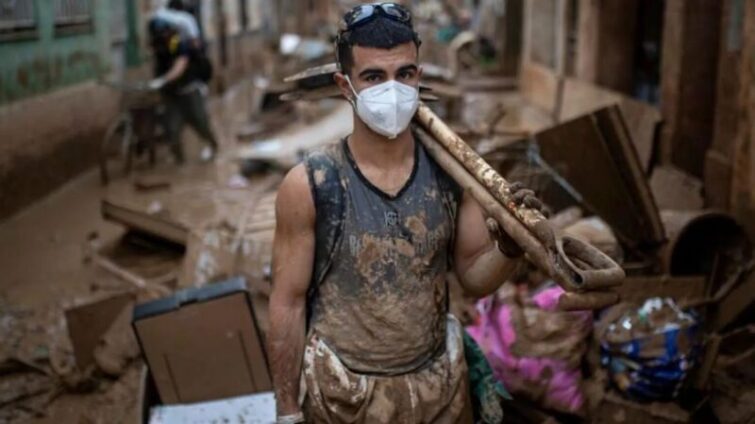
Audio By Carbonatix
The United Nations' COP climate talks are "no longer fit for purpose" and need an urgent overhaul, key experts including a former UN secretary general and former UN climate chief have said.
In a letter to the UN, senior figures say countries should not host the talks if they don’t support the phase-out of fossil energy.
This week the Azerbaijani president told world leaders gathered in his country for COP29 that natural gas was a “gift from God” and he shouldn’t be blamed for bringing it to market.
That came days after the BBC reported that a senior Azerbaijani official appeared to have used his role at COP to arrange a meeting to discuss potential fossil fuel deals.
The UN’s climate talks have made significant progress in recent years, even though unanimous agreement is needed among almost 200 countries to take action.
The Paris climate agreement, signed in 2015, outlines a long-term plan to rein in rising temperatures, as countries strive to keep that rise under 1.5C this century.
They have also agreed to transition away from fossil fuels in energy systems and to treble renewable power by 2030.
But while the authors of this letter recognise these achievements, they feel that the slow-moving COP process is “no longer fit for purpose” in dealing with a fast-moving climate crisis.
"Its current structure simply cannot deliver the change at exponential speed and scale, which is essential to ensure a safe climate landing for humanity," said its signatories. They include former UN Secretary General Ban-Ki Moon, former UN climate chief Christiana Figueres and former president of Ireland Mary Robinson.
This year will likely be the warmest on record, with emissions of planet warming gases still rising, while the impacts of warming often outpace the ability of countries to cope.
“Planet Earth is in critical condition,” said leading climate scientist Johan Rockström, another signatory.
“There is still a window of opportunity for a safe landing for humanity, but this requires a global climate policy process that can deliver change at exponential speed and scale,” Prof Rockström said.

The letter has been prompted by growing concerns about some of the countries chosen to host COP talks and their ability to deliver a significant advance in the fight against rising temperatures.
Just before the latest conference started, a secret recording showed the chief executive of Azerbaijan's COP29 team, Elnur Soltanov, discussing "investment opportunities" in the state oil and gas company with a man posing as a potential investor.

At the start of COP29, the country’s authoritarian leader, Ilham Aliyev, defended Azerbaijan’s current exports of gas and plans to expand production by a third in the next decade.
“It's a gift of God,” he told an audience in Baku.
“Every natural resource whether it's oil, gas, wind, sun, gold, silver, copper, all that are natural resources," he said.
"And countries should not be blamed for having them and should not be blamed for bringing these resources to the market because the market needs them, the people need them."
The use of oil and gas are major causes of global warming, as they release planet-warming gases like carbon dioxide when they are burned.
President Aliyev also hit out at France for carrying out colonialist “crimes” and “human rights violations” in overseas territories.
Such strongly expressed views are extremely rare from the leader of a COP host, where the aim is to build consensus on how to tackle rising temperatures.
The authors of the letter are also concerned by the selection process for hosting COPs. Azerbaijan followed on from another major oil producer, the United Arab Emirates, which held the conference in Dubai last year.
“At the last COP, fossil fuel lobbyists outnumbered representatives of scientific institutions, Indigenous communities and vulnerable nations," said former UN climate chief Christiana Figueres.
"We cannot hope to achieve a just transition without significant reforms to the COP process that ensure fair representation of those most affected.”
The authors say that host countries “must demonstrate their high level of ambition to uphold the goals of the Paris agreement."
They also want smaller, more frequent COPs with clear accountability for the promises that countries make.
Latest Stories
-
Opanin Joseph Kofi Nti
1 hour -
Flights cancelled and new travel warnings issued after Iran strikes
1 hour -
Helicopter crash: Children’s support fund surpasses GH¢10.15m
2 hours -
MobileMoney Ltd breaks silence on viral TikTok fraud claim, urges public to dial 419
3 hours -
Blind refugee found dead in New York after being released by immigration authorities
4 hours -
Stanbic Bank Ghana leads $205m financing for Engineers & Planners
4 hours -
MobileMoney Ltd responds to viral TikTok video by Healwithdiana, advises customers to report fraud on 419
4 hours -
Mobile Money Ltd’s Paapa Osei recognised in Legal 500 GC Powerlist: Ghana 2026
4 hours -
Flights in and out of Middle East cancelled and diverted after Iran strikes
4 hours -
Dr Maxwell Boakye to build 50-bed children’s ward at Samartex Hospital in honour of late mother
5 hours -
One killed and 11 injured at Dubai and Abu Dhabi airports as Iran strikes region
5 hours -
Former MCE, 8 others remain in custody over alleged land fraud in Kumasi
5 hours -
Black Queens players stranded in UAE over Israel-Iran conflict
6 hours -
James Owusu declares bid for NPP–USA chairman, pledges renewal and unity
6 hours -
Trump threatens strong force if Iran continues to retaliate
6 hours

